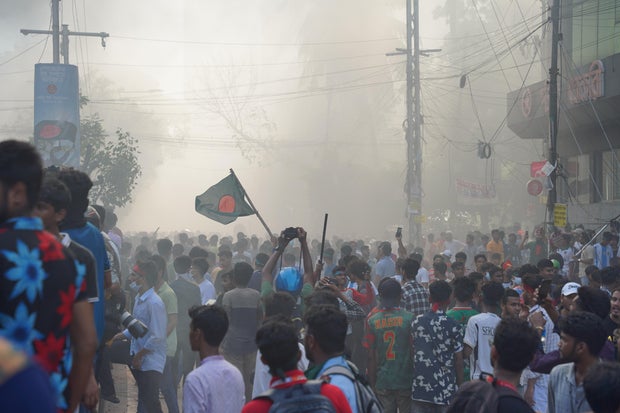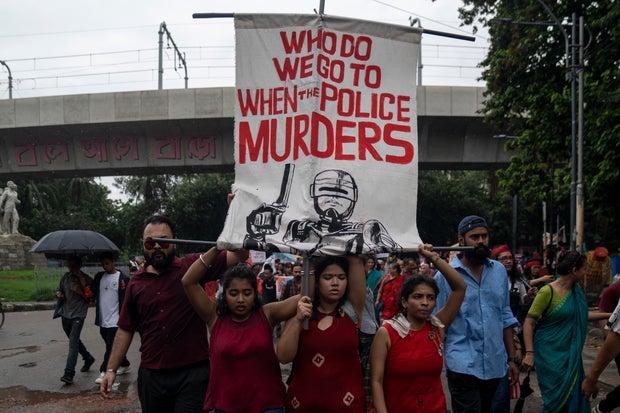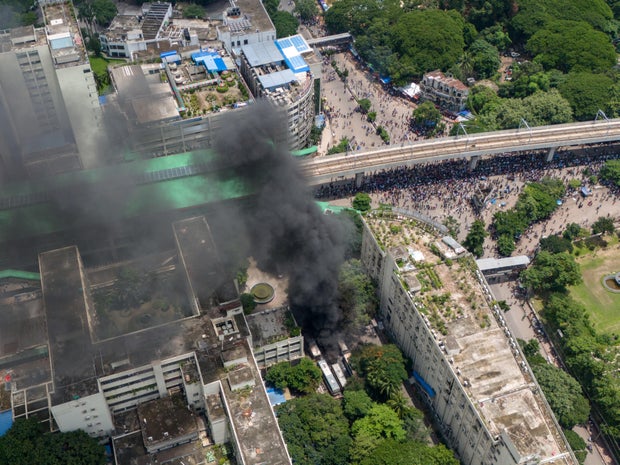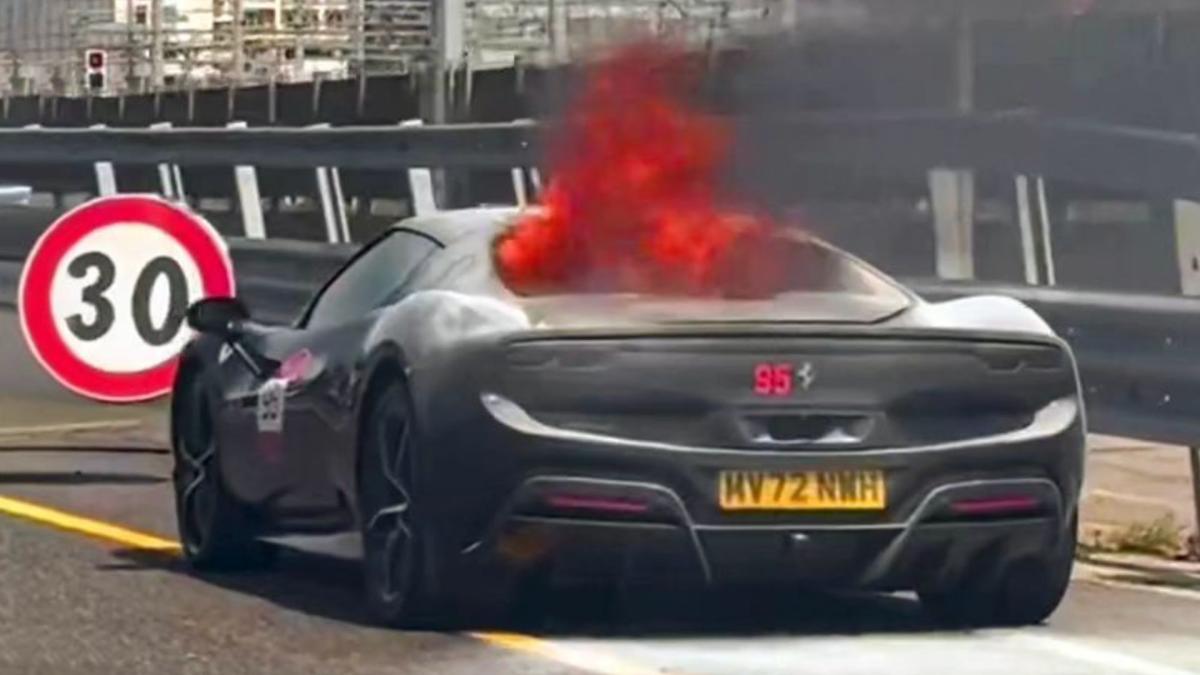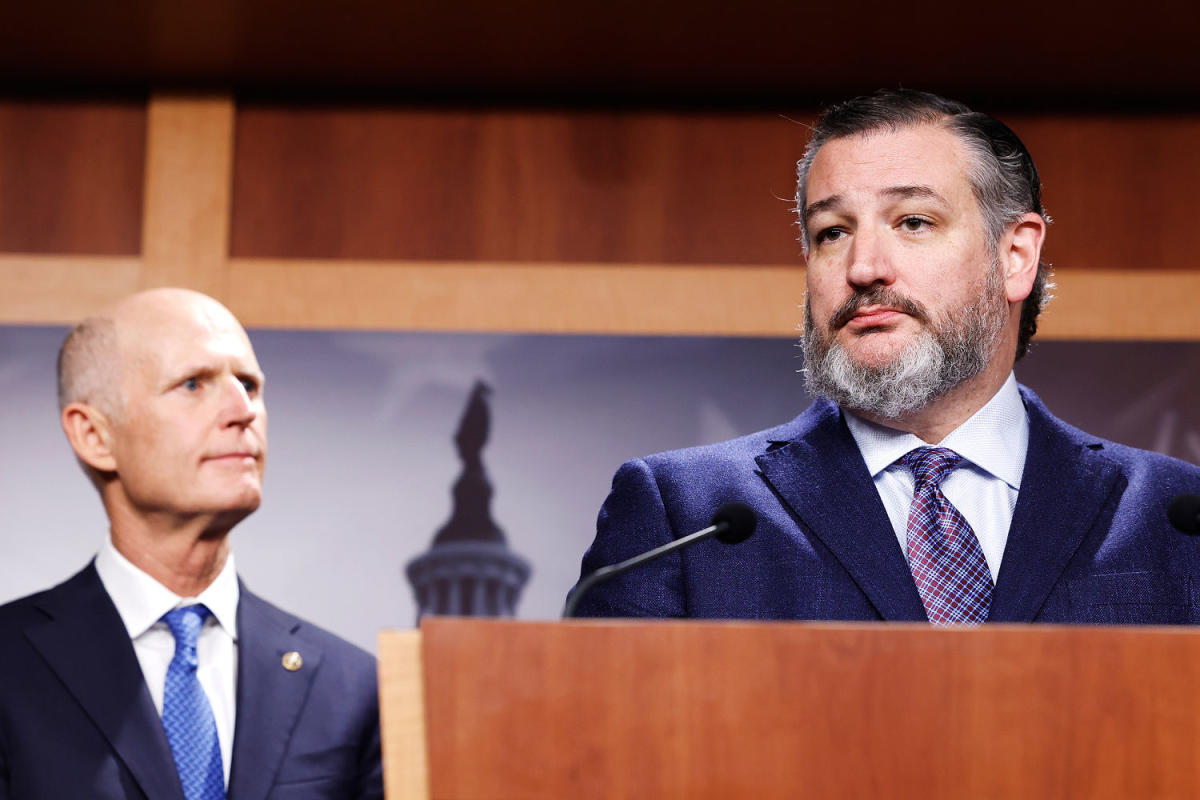Nearly 100 people were killed and hundreds injured on Sunday as renewed protests against the government swept through Bangladesh, where protesters demanded the prime minister step down. The prime minister accused them of “sabotage” and shutting down mobile internet in an attempt to quell the unrest.
The leading Bengali daily Prothom Alo reported that at least 95 people, including at least 14 police officers, were killed in the violence. The Channel 24 news channel reported at least 85 dead.
The military announced a new curfew on Sunday night for an indefinite period, including in the capital Dhaka and other divisional and district headquarters. The government had previously imposed a curfew with some exceptions in Dhaka and elsewhere.
Parvez Ahmad Rony/Drik/Getty Images
Protesters are demanding the resignation of Prime Minister Sheikh Hasina after last month’s protests, which began with students demanding an end to the a quota system for government jobsThese demonstrations turned violent, leaving more than 200 people dead.
As violence flared up again, Hasina said that the protesters who were committing “sabotage” and destruction were no longer students but criminals, and that the people should deal with them with an iron fist.
The ruling Awami League said the demand for Hasina’s resignation showed the protests had been hijacked by the main opposition Bangladesh Nationalist Party and the now-banned Jamaat-e-Islami party.
Also on Sunday, the government announced a holiday from Monday to Wednesday. Courts would remain closed indefinitely. Mobile internet was cut off and Facebook and messaging apps, including WhatsApp, were inaccessible.
Undersecretary for Information and Broadcasting Mohammad Ali Arafat said the services were being stopped to prevent violence.
At least 11,000 people have been arrested in recent weeks. The unrest has also led to the closure of schools and universities across the country, and authorities at one point a curfew for shooting on sight.
Protesters called for a “non-cooperative” effort, urging people not to pay taxes or utility bills and not to come to work on Sunday, a working day in Bangladesh. Offices, banks and factories opened, but commuters in Dhaka and other cities struggled to get to work.
Suman Kanti Paul/Drik/Getty Images
The protesters attacked the Bangabandhu Sheikh Mujib Medical University, a major public hospital in Dhaka’s Shahbagh district, and set several vehicles on fire.
Video footage showed protesters vandalizing a prison van in Dhaka’s chief metropolitan magistrate’s court. Other videos showed police opening fire on the crowd with bullets, rubber bullets and tear gas. Protesters set fire to vehicles and the offices of the ruling party. Some carried sharp weapons and sticks, according to TV footage.
In Dhaka’s Uttara district, police fired tear gas to disperse hundreds of people blocking a major highway. Protesters attacked homes and vandalized a community welfare office in the area, where hundreds of ruling party activists had taken up positions. Some crude bombs were detonated and gunfire was heard, witnesses said. Twenty people were hit by bullets east of the area.
At least 18 people were killed in the northwestern district of Sirajganj. That included 13 police officers who died after a police station was attacked by protesters, the Dhaka police headquarters said. Another officer was killed in the eastern Cumilla district, police said.
Five people were killed in Feni district in southeastern Bangladesh when Hasina supporters clashed with protesters.
Asif Iqbal, a doctor at a state hospital in Feni, told reporters that there were five bodies in the hospital, all hit by bullets. It was not clear whether they were protesters or ruling party activists.
Four people were declared dead after being rushed to hospital in Munshiganj district near Dhaka, hospital official Abu Hena said.
The Jamuna television news channel reported that violent clashes took place in more than a dozen districts, including Chattogram, Bogura, Magura, Rangpur, Kishoreganj and Sirajganj, where protesters backed by the main opposition party clashed with police and activists from the ruling Awami League party and its affiliates.
The protests began last month when students demanded an end to the quota system that reserved 30% of government jobs for the families of veterans who fought in Bangladesh’s 1971 war of independence from Pakistan.
Habibul Haque/Drik/Getty Images
At the height of the violence, the country’s Supreme Court ruled that the veterans’ quota should be reduced to 5%, with 93% of jobs to be allocated on the basis of merit. The remaining 2% will be reserved for members of ethnic minorities, transgender people and people with disabilities. The government accepted the decision, but protesters have continued to demand accountability for the violence, which they blame on the government’s use of force.
The system also reserves jobs for members of ethnic minorities and for the disabled and transgender. For them, the ruling reduced the quota from a combined 26% to 2%.
Hasina’s administration blames opposition parties and their student wings for inciting the violence, which also saw several state institutions set ablaze or vandalized.
Mirza Fakhrul Islam Alamgir, secretary-general of the main opposition party, once again called on the government to resign to end the chaos.
Hasina offered to meet with student leaders on Saturday, but a coordinator refused and announced she would resign with one point.
Hasina reiterated her promises to investigate the deaths and punish those responsible for the violence, saying she was ready to sit down whenever the protesters want her to.
The protests have become a major challenge to Hasina, who has ruled the country for more than 15 years. She returned to power for a fourth consecutive term in January in an election boycotted by her main opponents.


